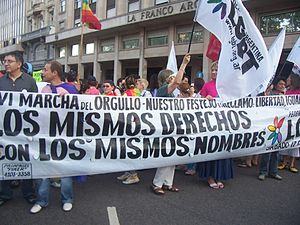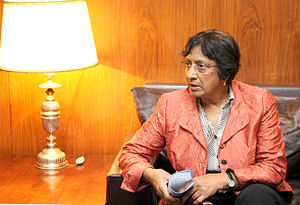| Image via Wikipedia |
I'm rounding up the year in a series of posts - in which no doubt I've missed something, so please let me know what I've missed in the comments!
Decriminalization of homosexuality and anti-discrimination
We saw an increased impact in 2011 of the work of the UN Human Rights Council, particularly its Universal Periodic Review (UPR) process of interrogating country's human rights records, and other long term work by activists starting to bear fruit in other parts of the United Nations and other international bodies as well.
The passage of a resolution against killings of LGBT at the end of last year, reversing an attempt by the Organization of the Islamic Conference (OIC) and some African countries at halting LGBT progress in international bodies, sparked a global reaction, including demonstrations and novel contact with governments by local LGBT.
It marked the change in approach by Rwanda in particular, which had previously backed off criminalization, with its UN ambassador drawing on the country's experience of genocide to send a message to those claiming that LGBT is not defined or that LGBT don't even exist.
It marked the first sign of historic change in Cuba, which appears likely to culminate in same-sex unions and anti-discrimination laws agreed by the Communist Party next year. The way that other Caribbean countries changed positively on the UN vote on killings also marked a development which continued in several island nations during 2011.
A change of approach by South Africa on the international LGBT rights front, due to internal civil society pressure, led to them proposing the historic July resolution affirming LGBT rights at the Human Rights Council, which then led to the publication of the first UN report on LGBT human rights in December. That July resolution also caused further ripples, including the first public affirmation of LGBT rights by a Gulf civil society group, in Bahrain.
It emerged that the organised backlash against LGBT rights in international bodies, led by the OIC, Russia and the African group, was receiving support from American Christian fundamentalist bodies such as CFAM. The same people who are losing the 'culture war' at home have shifted to intervening in Africa and the Caribbean and various countries repeated their arguments/lies, such as Uganda claiming at the UN Human Rights Council that lesbians and gays 'recruit'. However it was also clear from investigative reporting at UN HQ that many of the no-shows, abstentions or yes votes of various countries during key UN LGBT rights votes was largely down to US diplomatic pressure. This showed how both US and European pressures on LGBT rights is already happening, and working, in a year which saw extensive simplified and often inaccurate reporting on the use of such 'leverage', like the supposed 'colonialist' tying of development aid to LGBT rights.
Four countries committed themselves to decriminalization: São Tomé and Príncipe; Nauru; The Seychelles, and; Northern Cyprus.
In Botswana LGBT launched, then put on hold, a legal push for decriminalisation. and in Belize LGBT started their legal challenge to criminalisation on constitutional grounds. Jamaican law is to be challenged at the Inter-American Commission on Human Rights (IACHR) and the opposition leader called for a review of the buggery law.
In Chile all anti-gay discrimination was banned. Colombia passed an anti-discrimination law which includes prison terms. In South Africa government action began on so-called 'corrective rape', following massive international attention. But in Brazil, passage of a hate crimes law failed due to increased evangelical Christian influence in that country. And in Malawi, the government criminalized lesbians and used LGBT rights as a wedge issue against its opponents.
The anti-criminalization effort at the Commonwealth Summit failed but it did raise the issue widely in media worldwide.
Several former African leaders came out for decriminalization. In her fantastic speech on gay rights at the UN in December, US Secretary of State Hillary Clinton pointedly mentioned one, former Botswana leader Festus Mogue. But only the Zimbabwean leader Morgan Tsvangarai offered support for LGBT amongst current African leaders.


































 Join our page
Join our page

